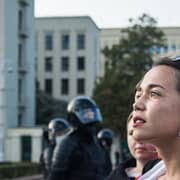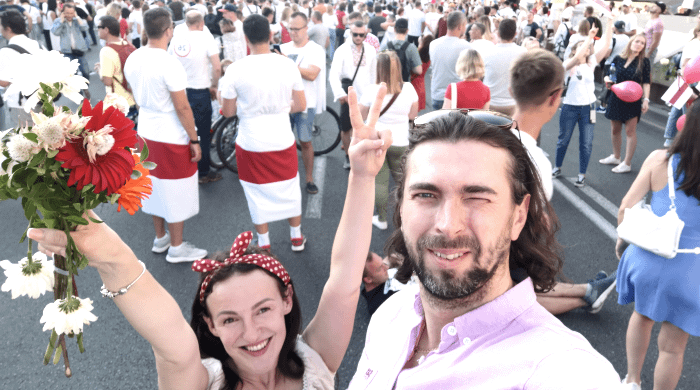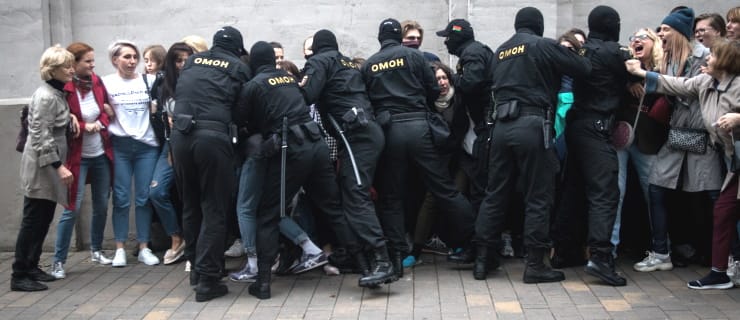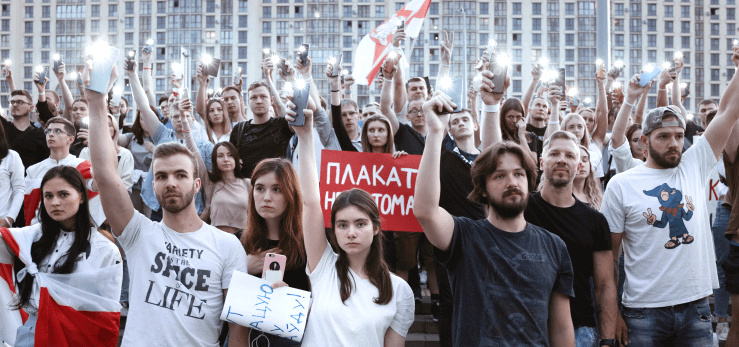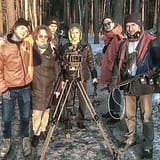Belarus – The short dream of freedom 44 min.
A film by Irene Langemann, ©Lichtfilm/WDR 2022
Editors: Beate Schlanstein / Nicole Ripperda
In world distribution by Newdocs , first broadcast on 21.3.2022
We’ve never seen this before: the film was being worked on right up to the day of the broadcast and aired in the evening on the first channel. 1.3 million viewers, 8.8%. This was followed the next day by Tagesschau 24, then Phoenix twice, 4 days in a row, at good broadcasting times. And lots of good feedback from ARD editors and colleagues: Great protagonists, clever storytelling and the emotional impact of the constant escalation in the description of oppression. And hope at the end. Hymnic viewer mail, direct e-mails and joy from the Belarusian community in Germany. The film came at the right time so that their revolution would not be forgotten in these terrible times of war in Ukraine.
TV journalists Natalia and Mikhail Maksimov still remember the day that changed their lives. “Nobody expected that there would be so much violence on August 9. That such a gigantic massacre would happen.” Both worked for Belarusian state television, including on the day of the presidential election in summer 2020. This time, the population clearly did not want to see the “last dictator of Europe”, Alexander Lukashenko, at the head of state again. Many supported the women’s team led by Svetlana Tsikhanouskaya. But Lukashenko had the results falsified and declared himself the winner. Hundreds of thousands of people from all parts of the population protested against this fraud and the arbitrariness of the state apparatus – something that had never happened on this scale before in Lukashenko’s decades of rule. His reaction: the regime crushed the peaceful protests with brutal force, imprisoned the demonstrators and had many of them abused and tortured. Svetlana Tikhanovskaya and other leading members of the opposition were forced to flee abroad. But ordinary citizens who had taken part in protests or strikes against the regime were also forced to leave Belarus. Like the television journalist and her husband.
The story traces how the Lukashenko regime suppressed widespread popular protest and silenced the public. Author Irene Langemann met exiled Belarusians in Poland and Germany who talk about their experiences after the rigged elections and provide exclusive insights into the actions of the power apparatus. For example, the former lieutenant colonel of the Belarusian police Alexander Azarov, who switched sides after the elections and joined the BYPOL organization in Poland. This organization was founded by former members of the Belarusian security forces to collect witness statements and data on torture, recordings of telephone conversations and videos with incriminating footage and to store them for future trials. Former Belarusian Culture Minister Pavel Latushko also fled to Warsaw and is now one of the leading figures in the exile opposition. With the knowledge he has today, he says, he should have been at the forefront of the protests and ensured free reporting. “Because what shocked people when the internet was switched back on was the lawlessness and violence. If it had been shown nationwide, it might have shaken up the whole country.” Maria Kolesnikova stood up to the regime as one of the figureheads of the opposition. She was arrested and sentenced to eleven years in prison. Her sister Tatiana Khomich regularly reminds international politicians of the fate of the numerous political prisoners in Belarus.
Many Belarusians in exile believe that the peaceful revolution has welded the people together as a nation for the first time. Until the ruler used violence to silence all criticism. The story follows the personal fates of the protagonists and at the same time the drama of the country. Moving archive footage and little-known images from private sources show what has happened in Belarus since the 2020 elections. They allow deep insights into the suppression of a democratic movement – insights that are particularly oppressive and revealing in view of the war in Ukraine.
.

